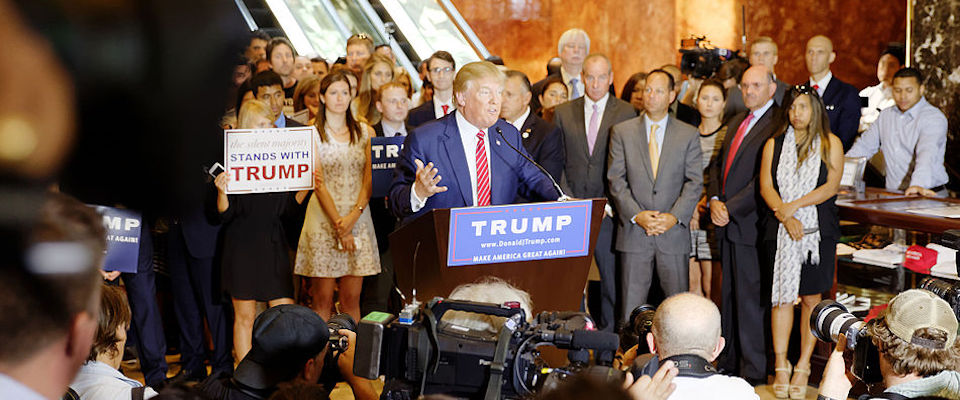Since Donald Trump announced that he was running for president this past June, he’s spread through news headlines like the Resident Evil t-Virus. Judging by the number of readers he’s attracting and supporters he’s gaining, we now appear to be a nation of Trump zombies with an insatiable hunger for his next sapid statement or offhand comment.
Perhaps it is his endlessly entertaining and outlandish performance, one that is bolder and louder and imbued with more braggadocio than anyone else, that is pulling people away from other Republican candidates that they’d supported before The Donald even entered the picture.
People search Trump online more than any other candidate, he dominated new and traditional media leading up to last night’s debate, and some pundits are suggesting that the news is so saturated with Trump that other candidates will never regain their footing among voters. On the premiere of the new Late Show, even Stephen Colbert admitted to having the sickness.
“Oh Donald, I love you too,” Colbert said, pouring a bag of Oreos all over himself in response to Trump swearing off Nabisco products because the company moved one of its plants to Mexico. “I think I’m gonna hate myself in the morning.”
But perhaps this is a fever we will sweat out, and Trump will fall by the wayside like the Tea Party favorites of yore (e.g. Michele Bachmann, Sarah Palin, Herman Cain, Newt Gingrich, and Rick Santorum). Or perhaps not. Recent findings regarding how people vote indicate that once a candidate gets into voters’ good graces, he’ll likely stay there, even if that candidate later puts forth ideas and policies that the voter would not have originally supported.
 Caricatures of GOP candidates of the past and present, Credit: Wikimedia Commons
Caricatures of GOP candidates of the past and present, Credit: Wikimedia Commons
In Follow The Leader? How Voters Respond to Politicians’ Policies and Performance, UC Berkeley political science professor Gabriel Lenz analyzed political surveys from the US and other countries that were designed to capture attitudes toward candidates before and after campaigns. He found that performance trumps policies when it comes to who voters’ choose to support — “performance” including how successful voters perceive the candidates to be, how trustworthy they appear, how well they campaign, and at times, even how they look. These things seem to matter more than whether they actually agree with the particulars of a politician’s agenda.
“Looking across a lot of countries and surveys, I find that most people never change who they’re going to vote for; they just change their opinion,” said Lenz. “So if Trump supporters learn that he wants to build a wall between here and Mexico — and they never thought about the issue before … They’ll say, ‘Uh, I guess I support that too.’”
Don’t believe this is a thing? Well apparently, it’s a thing.
In August, famous pollster Frank Luntz led a focus group of 29 people; Six of them were ex-Trump supporters and the rest identified as current supporters. Luntz discussed Trump’s past liberal viewpoints, like how he was once pro-choice and supported marijuana legalization. He also showed them a video of Trump saying, “If Ivanka weren’t my daughter, I’d be dating her.”
“When people judge politicians, it’s not about whether a policy sounds right or feasible or well designed or anything like that. It’s about whether the words that come out of [politicians’] mouths suit and fit a worldview…”
When it was all over, not one person who supported Trump would change his or her vote. In addition, the group as a whole was willing to attribute comments they might otherwise find unsavory to Trump’s sense of humor.
How to explain such cognitive dissonance?
“When people judge politicians, it’s not about whether a policy sounds right or feasible or well designed or anything like that. It’s about whether the words that come out of [politicians’] mouths suit and fit a worldview. Everything else is secondary,” said Dr. Lawrence Rosenthal, Executive Director and Lead Researcher of the Berkeley Center for Right-Wing Studies. “If you tell Trump supporters that he’s making up this and he’s making up that, it won’t matter … because he’s articulating a worldview successfully.’”
And research shows that voters’ political perspectives and worldviews can be determined early in life.
Last year, researchers at Catalist, a progressive political consultancy group, released a study charting how the voting preferences of whites born between 1937 and the early 1990s changed over time. The study showed that significant political events people experienced between the ages of 14 and 24 determined how most of them voted for the rest of their lives. Political events lived through at age 18 were shown to be about three times as influential as those experienced at age 40. This suggests that once a person’s political views are set, there is little deviation. For instance, those who came of age during the presidency of the very popular Dwight D. Eisenhower ended up forming Republican preferences that lasted the rest of their lives.
If the Catalist model holds true, at least 50 percent of middle-aged people and 65+ people (a.k.a., the people who vote the most) will most likely lean Republican, especially in the restless wake of Obama, which means their worldview probably intersects with Trump’s at some point.
Okay, I know. Not everyone loves Trump, and his bombastic performance is abhorred by some Republicans and presumably, most Democrats — particularly when he’s contrasted with the seemingly angelic Ben Carson, who is all about being soft-spoken and humble, which he (ironically) boasted about in an essay published in NewsMax last Tuesday.
But the fact remains that press is press, and if Trump can accrue plenty of fans early on, he may get them to stick with him — especially since Trump understands that people often want leaders who make immense promises about an idealized future.
In his book, The Art of the Deal, Trump writes: “People may not always think big themselves, but they can still get very excited by those who do. That’s why a little hyperbole never hurts. People want to believe that something is the biggest and the greatest and the most spectacular.”
What makes Trump so appealing to his supporters is that they see him as an honest man who says what he thinks — whether or not what he says is completely wrong and offensive to many.
In a post on The Berkeley Blog, Rosenthal suggests that it is Trump’s vulgarity that inoculates him against the kinds of gaffes that would ordinarily knock other people out of electoral consideration. He compares Trump to Archie Bunker, the lovable bigot from the old TV show All in the Family.
But even if an antidote for the t-Virus is found and Trump goes dormant as did Bachmann et al, symptoms could remain — forcing us to cough up remnants of his influence well into next year.
“Gaffes are fully part of the appeal,” Rosenthal writes.
Trump is so popular and influential right now that the success of other GOP candidates like Carly Fiorina and Ben Carson is currently measured by their counterpunches to Trump — Fiorina’s ability to go at him head on, and Carson’s strategy of duck and cover, perhaps aiming to tire out The Donald before making a move.
Even though last night’s debate indicates that the other candidates could finally be giving The Donald a run for his money — with Fiorina calling out Trump for perceived chauvinistic comments he’s made, and Sen. Marco Rubio, Gov. John Kasich, and Gov. Chris Christie giving clearer and more concise answers to questions on economic and foreign policy — Trump still got more air time than any other candidate in the three hour debate. And a lot of moderator Jake Tapper’s questions were framed around The Donald (e.g. “Would you feel comfortable with Donald Trump’s finger on the nuclear codes?”)
But even if an antidote for the t-Virus is found and Trump goes dormant as did Bachmann et al, symptoms could remain — forcing us to cough up remnants of his influence well into next year. Voter expectation might, for example, push other nominees to make “spectacular” promises. And it may be that any attempt by the media to steer voters toward more logical, non-Trumpian policies in the future will be for naught.
“Although campaigns and media provide information that could help voters pick the candidates who would further the voters’ own policy goals,” Lenz writes in Follow The Leader? “Voters generally disregard this information.”




















